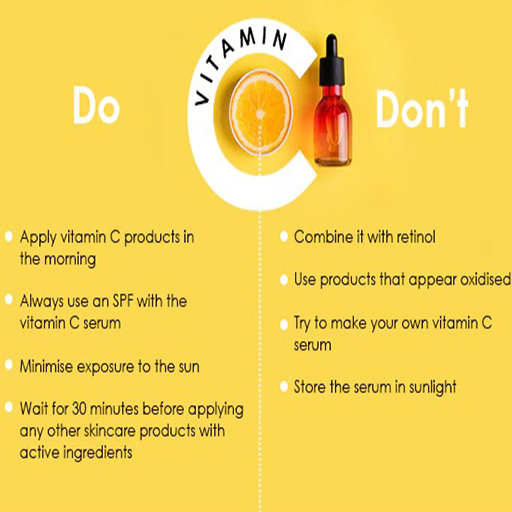The Power of Vitamin C in Your Skincare Routine

Vitamin C is like a superhero to your skincare routine, it has several powers that can enhance your skin’s overall health and appearance. This powerful antioxidant works to help the skin become firmer, reduce inflammation, and boost the skin’s natural defenses against environmental damage.
Vitamin C has also been proven to brighten the complexion and reduce the signs of aging. It’s even clinically proven to help reduce sunburn and post-inflammatory hyperpigmentation. With all of that it’s no secret why adding a Vitamin C product to your skincare routine can have such a profound impact on the skin.
Benefits Of Vitamin C for a Skincare Routine:

The benefits of Vitamin C to the skin are tremendous. And can make a difference in your everyday skin. Vitamin C is known for its ability to strengthen the skin barriers, and ward off damage from environmental stressors. It also helps to reduce hyperpigmentation, age spots, and dark spots.
Vitamin C has been clinically proven to aid in the production of collagen. Which is an important component in skin’s firmness and elasticity. Vitamin C can even offer a boost in hydration, helping the skin to stay healthy and well-moisturized.
It’s important to note that Vitamin C is highly unstable and can become oxidized. If not correctly stored away from exposure to light and air. When purchasing Vitamin C products. It’s important to double check the expiration date before buying and make sure that the product has been stored correctly.
Types of Vitamin C For Skincare Routine:
Most skincare products are formulated with Vitamin C. But it’s important to keep in mind that not all Vitamin C is created equal. Two of the most common forms of Vitamin C used in skincare products are L-Ascrobic Acid and Sodium Ascorbyl Phosphate.
L-Ascorbic Acid is the form most often used in skincare products. Because it has the highest concentration level and most powerful antioxidant properties. However, because it is highly unstable, it can be very irritating to the skin if used daily.
Sodium Ascorbyl Phosphate, on the other hand, is a stabilized form of Vitamin C. Making it gentler on the skin and more suitable for everyday use
The antioxidant power of Vitamin C makes it a great ally for fighting free radical damage caused by environmental stressors such as pollution and the sun, which can lead to the breakdown of collagen and subsequent sagging, fine lines, and wrinkles. By fighting off the oxidative damage of free radicals. Vitamin C helps preserve the skin’s youthful looking complexion.
Brightening the skin complexion is another benefit of Vitamin C that can be seen both short-term and long-term. Vitamin C has also been found to help reduce dark spots and post-inflammatory hyperpigmentation.
The last benefit of Vitamin C that shouldn’t be overlooked is its ability to reduce inflammation. Which can be key in treating and preventing the appearance of acne. Its antioxidant power not only helps reduce inflammation but can also help fight bacteria, which can cause acne lesions.
Vitamin C as Skincare Ingredient:

Vitamin C is a powerhouse ingredient that has many amazing benefits and can be a great addition to your skincare routine. If you’re looking to get started. Look for products that are specifically formulated to be gentle and stable. As this will ensure that you get the most out of your Vitamin C skincare products.
If you’re looking to get the most out of Vitamin C skincare products. You should tailor your regimen according to the specific needs of your skin. For example, if you’re looking to reduce wrinkles and age spots, look for products with higher concentrations of L-Ascorbic Acid. If you’re looking for a product that helps with hyperpigmentation. Look for an exfoliating product with Sodium Ascorbyl Phosphate.
These are just a few of the ways that you can incorporate Vitamin C into your skincare routine. Remember, Vitamin C is powerful and can have amazing benefits. But it should be used with caution. Always make sure to do a patch test before trying any product on your face. And if you’re looking to use a Vitamin C product every day, be sure to look for one that’s formulated to be gentle on the skin.
What to Couple With Vitamin C?
Foods:
For maximum skin health benefits, you should aim for a vitamin C intake of at least 500 milligrams per day. A diet that includes plenty of fruits and vegetables should provide ample vitamin C. Vitamin C is also available in supplement form. And is often combined with other vitamins and antioxidants in formulations designed specifically to improve skin health.
Coupled with a balanced diet, you can also ensure you are getting enough vitamin C by using topical skincare that contains the vitamin, such as serums, creams, and gels. As with supplements, the topical form of vitamin C can help to boost collagen production and provide added defense against sun damage. For maximum benefit, you should also include other antioxidants, such as Vitamin E or resveratrol in your skincare regimen.
No matter, how you choose to get your vitamin C. It is essential for keeping your skin looking and feeling its best. The benefits of vitamin C are hard to argue with and by incorporating it into your diet and skincare routine. You can give your skin the protection and care it needs.
Vitamin C is essential for healthy skin and you should aim for a daily dose of at least 500 milligrams of vitamin C. Eating plenty of fruits and vegetables is always beneficial.
Supplements:
Adding a vitamin C supplement to your daily routine may be necessary if you fall short on dietary sources. Vitamin C can also be applied topically to the skin to boost collagen production and get added protection against sun damage. By taking vitamin C internally and applying it topically, you can help to support skin health and keep your skin looking its best.
When looking for a vitamin C supplement, it’s important to look for one that contains other key ingredients such as Vitamin E, amino acids, and vitamins A, D and K. These ingredients are essential in supporting skin health and helping to reduce the effects of aging. When used together, they can work synergistically to boost the skin’s natural production of collagen and reduce wrinkles. While also helping to protect against environmental damage and keep skin looking even, supple and youthful.
When looking for a topical vitamin C product, look for one that contains L-ascorbic acid. This is a form of vitamin C that is rapidly absorbed by the skin and easily penetrates the skin’s cells. It is the most powerful form of vitamin C for fighting signs of aging and is highly effective when applied on a regular basis. When applied topically, vitamin C helps to brighten the skin, fade dark spots and discoloration, and reduce wrinkles and fine lines.
If you’re just starting to incorporate Vitamin C into your skincare routine, be sure to start small and stay consistent. Incorporate Vitamin C in small doses and increase the concentration level over time. As this will help you get the most out of your products and prevent any adverse reactions.

Lastly, be sure to use an SPF product every day. As this will help to protect the skin from environmental damage.

